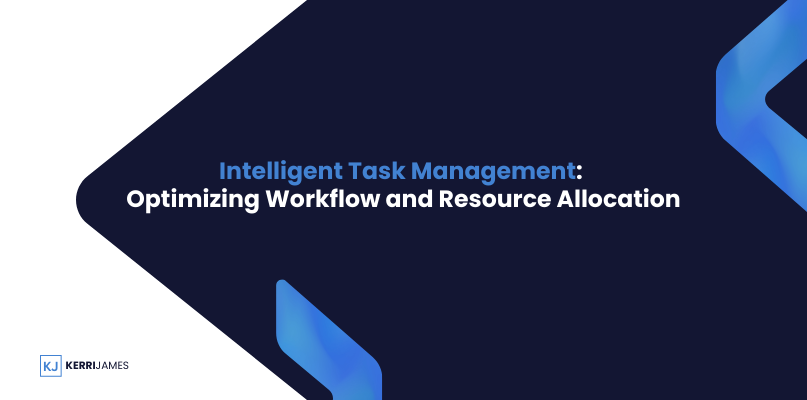In today’s fast-paced work environment, managing tasks and resources effectively has become increasingly complex. As organizations grow and projects become more intricate, the old methods of task management—jotting down to-do lists on sticky notes or assigning tasks haphazardly—no longer suffice. To stay competitive and efficient, law firms and other professional services need to adopt intelligent task management strategies that not only streamline workflows but also ensure that resources are allocated where they’re needed most.
Intelligent task management goes beyond traditional approaches by incorporating technology, data, and real-time monitoring to optimize how tasks are handled and resources are used. By implementing these advanced strategies, organizations can enhance productivity, reduce inefficiencies, and maintain a high level of quality in their work. In this blog post, we’ll explore what intelligent task management is, how it can be implemented, and the benefits it brings to modern work environments.
Understanding Intelligent Task Management
Definition
Intelligent task management refers to the use of advanced tools, techniques, and strategies to manage tasks more efficiently and effectively. Unlike traditional task management, which often relies on manual processes and static lists, intelligent task management leverages technology, automation, and data-driven decision-making to optimize how tasks are assigned, tracked, and completed.
Importance in Modern Work Environments
As work environments become more complex, with teams spread across different locations and projects requiring a higher level of coordination, the need for intelligent task management has grown. Today’s professionals are expected to juggle multiple tasks, collaborate with colleagues across time zones, and deliver high-quality work under tight deadlines. Intelligent task management helps organizations meet these demands by providing the tools and insights needed to allocate resources effectively and keep workflows running smoothly.
Key Components
The key components of intelligent task management include automation, data-driven decision-making, and real-time monitoring. Automation reduces the burden of repetitive tasks, allowing employees to focus on more strategic work. Data-driven decision-making ensures that tasks are assigned and managed based on insights rather than intuition, leading to better outcomes. Real-time monitoring allows for dynamic adjustments to workflows, ensuring that any issues are addressed promptly.
The Role of Technology in Intelligent Task Management
Task Management Tools
Technology plays a central role in intelligent task management. Task management software, such as Trello, Asana, and Monday.com, provides a platform for teams to organize, assign, and track tasks in real time. These tools often include features such as task prioritization, deadlines, and notifications, which help ensure that tasks are completed on time and according to plan.
For example, a law firm might use a task management tool to track the progress of cases, assign tasks to team members based on their availability and expertise, and set deadlines for key milestones. By centralizing task management in one platform, the firm can reduce the risk of miscommunication and ensure that everyone is on the same page.
Automation and AI
Automation is another critical aspect of intelligent task management. By automating routine tasks—such as sending follow-up emails, generating reports, or scheduling meetings—organizations can free up valuable time for more strategic activities. Automation tools like Zapier or AI-powered assistants like Microsoft’s Cortana or Google Assistant can integrate with task management software to streamline workflows and reduce manual effort.
AI also plays a growing role in task management by analyzing data and making recommendations for task assignment, prioritization, and resource allocation. For instance, AI can predict potential bottlenecks in a project based on past performance data and suggest adjustments to the workflow to prevent delays.
Integration with Other Systems
For task management to be truly effective, it needs to be integrated with other systems used within the organization. This includes project management tools, customer relationship management (CRM) systems, and communication platforms. By integrating task management software with these systems, organizations can create a seamless workflow where information flows freely between different tools, reducing the need for manual data entry and ensuring that tasks are aligned with overall project goals.
For example, integrating a task management tool with a CRM system can help a sales team track the progress of deals and ensure that follow-up tasks are completed in a timely manner. Similarly, integration with communication tools like Slack or Microsoft Teams can facilitate real-time collaboration and keep all team members informed of any updates or changes.
Optimizing Workflow Through Intelligent Task Management
Workflow Mapping
One of the first steps in optimizing workflow through intelligent task management is to map out existing workflows. Workflow mapping involves documenting the sequence of tasks involved in a process, identifying who is responsible for each task, and pinpointing any potential bottlenecks or inefficiencies. This visual representation of the workflow helps teams understand the current state of their processes and identify areas for improvement.
For instance, in a law firm, a workflow map for case management might include steps such as client intake, document review, legal research, drafting, and client communication. By mapping out these steps, the firm can identify where tasks are being delayed or where resources are being underutilized. This information can then be used to streamline the workflow, ensuring that tasks move smoothly from one stage to the next.
Prioritization and Task Assignment
Effective prioritization is a key element of intelligent task management. Not all tasks are created equal, and some require more immediate attention than others. By using task management tools that allow for prioritization, teams can ensure that critical tasks are completed first, while less urgent tasks are scheduled for later.
In addition to prioritization, task assignment should be based on team members’ skills and availability. Intelligent task management tools often include features that allow managers to see who is available and who has the right expertise for a particular task. This ensures that tasks are assigned to the most suitable team members, improving the quality of work and reducing the likelihood of errors.
For example, in a marketing agency, tasks related to client strategy might be prioritized over routine content creation. By assigning strategic tasks to senior team members and routine tasks to junior staff, the agency can ensure that its most valuable resources are used where they’re needed most.
Real-Time Monitoring and Adjustments
One of the advantages of intelligent task management is the ability to monitor tasks and workflows in real time. Real-time monitoring provides visibility into the status of tasks, allowing managers to see which tasks are on track and which are falling behind. This information is crucial for making dynamic adjustments to the workflow, such as reassigning tasks, adjusting deadlines, or reallocating resources.
For instance, if a law firm notices that a critical deadline is at risk of being missed due to an unforeseen delay, real-time monitoring allows them to reassign tasks or bring in additional resources to get the project back on track. This proactive approach helps prevent issues from escalating and ensures that projects are completed on time and to a high standard.
Resource Allocation: Getting the Most Out of Your Team
Skill-Based Allocation
One of the key principles of intelligent task management is allocating tasks based on team members’ skills and strengths. Skill-based allocation ensures that tasks are handled by the individuals who are best equipped to complete them, leading to higher quality work and greater efficiency.
For example, in a law firm, complex legal research might be assigned to an attorney with specialized knowledge in the relevant area of law, while routine document review might be assigned to a paralegal. By matching tasks to the appropriate skill level, the firm can ensure that each task is completed accurately and efficiently.
Load Balancing
Balancing workloads across the team is another important aspect of resource allocation. Overloading certain team members while others have less work can lead to burnout, decreased productivity, and lower quality outcomes. Intelligent task management tools often include features that allow managers to see each team member’s workload and adjust task assignments accordingly.
Load balancing helps ensure that no one is overwhelmed with too many tasks, while also making sure that everyone is contributing to the team’s overall goals. This leads to a more equitable distribution of work and helps maintain consistent productivity across the team.
For example, in a tech startup, load balancing might involve distributing development tasks evenly among engineers to ensure that no one is overburdened. This approach not only prevents burnout but also ensures that projects move forward at a steady pace.
Time Management
Effective time management is critical to optimizing workflow and resource allocation. Time management techniques such as time-blocking and the use of time-tracking tools can help teams stay on schedule and ensure that tasks are completed within the allotted time.
Time-blocking involves setting aside specific blocks of time for different tasks, helping individuals focus on one task at a time without distractions. Time-tracking tools, on the other hand, allow teams to monitor how much time is being spent on each task and identify areas where time could be used more efficiently.
For example, in a consulting firm, time-blocking might be used to ensure that consultants dedicate sufficient time to client meetings, project work, and administrative tasks. Time-tracking tools could then be used to analyze how much time is being spent on each activity and make adjustments to improve efficiency.
The Benefits of Intelligent Task Management for Law Firms and Professional Services
Improved Efficiency
One of the most significant benefits of intelligent task management is improved efficiency. By automating routine tasks, optimizing workflows, and ensuring that resources are allocated effectively, organizations can reduce the time and effort required to complete tasks. This not only improves productivity but also allows teams to take on more work without compromising quality.
For example, a law firm that uses intelligent task management tools to streamline case management can handle more cases in less time, leading to higher revenue and greater client satisfaction.
Enhanced Collaboration
Intelligent task management also improves collaboration among team members, particularly in remote or hybrid work environments. Task management tools that include communication features, such as chat or file sharing, allow team members to collaborate in real time, regardless of their location.
This enhanced collaboration leads to better coordination, faster decision-making, and more effective teamwork. For example, in a marketing agency, task management tools can facilitate collaboration between copywriters, designers, and project managers, ensuring that campaigns are executed smoothly and on time.
Higher Quality of Work
Optimized task management leads to higher quality outcomes by ensuring that tasks are completed by the right people at the right time. By prioritizing tasks, allocating resources based on skills, and monitoring progress in real time, organizations can maintain high standards of quality even as they increase efficiency.
For example, a tech startup that uses intelligent task management to allocate development tasks based on engineers’ expertise can produce higher quality products, leading to greater customer satisfaction and competitive advantage.
Case Studies: Successful Implementation of Intelligent Task Management
*note that the names of firms are anonymized.
Case Study 1: A Law Firm’s Case Management Transformation
A mid-sized law firm specializing in corporate law was struggling with managing its growing caseload. The firm implemented an intelligent task management system that integrated with its existing case management software. By automating routine tasks such as document generation and client communication, the firm was able to reduce the time spent on administrative work by 30%. Real-time monitoring allowed the firm to quickly identify and address any delays in case progression, leading to faster case resolution and higher client satisfaction.
Case Study 2: A Marketing Agency’s Automation Success
A marketing agency serving small businesses implemented automation tools to manage its client projects more efficiently. The agency used AI-powered tools to automate tasks such as social media posting, email marketing, and reporting. By integrating these tools with its task management software, the agency was able to reduce manual work and focus more on strategy and creative development. As a result, the agency saw a 25% increase in client retention and a 15% increase in revenue within the first year.
Case Study 3: A Tech Startup’s Resource Optimization
A tech startup developing a new software product faced challenges with resource allocation as it scaled up its development efforts. The startup implemented a task management tool that integrated with its development platform, allowing it to allocate tasks based on engineers’ expertise and availability. By optimizing task assignment and load balancing, the startup was able to reduce development time by 20%, leading to faster product launches and increased market share.
Overcoming Challenges in Implementing Intelligent Task Management
Resistance to Change
One of the common challenges in implementing intelligent task management is resistance to change. Employees may be hesitant to adopt new tools or strategies, particularly if they are accustomed to traditional methods. To overcome this resistance, organizations should involve employees in the selection and implementation of new tools, provide training and support, and communicate the benefits of the new system clearly.
Cost Considerations
Implementing intelligent task management tools can involve significant upfront costs, particularly for small businesses or firms with limited budgets. However, the long-term benefits—such as increased efficiency, higher quality work, and reduced labor costs—often justify the investment. Organizations should conduct a cost-benefit analysis to determine the potential return on investment and consider phased implementation to manage costs.
Training and Adoption
For intelligent task management to be effective, employees must be properly trained on how to use the new tools and strategies. Ongoing training and support are essential to ensure that employees are comfortable with the new system and can use it to its full potential. Organizations should also monitor adoption rates and address any challenges that arise during implementation.
Future Trends in Task Management
AI and Machine Learning
As AI and machine learning continue to evolve, their role in task management is likely to expand. These technologies have the potential to predict task outcomes, optimize resource allocation, and even identify potential risks before they occur. For example, AI-powered tools could analyze past project data to predict the likelihood of delays and suggest adjustments to the workflow to keep projects on track.
Remote and Hybrid Work
The shift to remote and hybrid work models has accelerated the adoption of task management tools, and this trend is expected to continue. As more organizations embrace flexible work arrangements, task management tools will need to evolve to support remote collaboration, time management, and resource allocation. Features such as real-time collaboration, cloud integration, and mobile accessibility will become increasingly important.
Sustainability and Task Management
Sustainability is becoming a key consideration for many organizations, and task management can play a role in promoting sustainable work practices. By optimizing workflows and resource allocation, organizations can reduce waste, improve energy efficiency, and minimize their environmental impact. For example, intelligent task management can help organizations reduce paper usage by digitizing workflows and encourage remote work to reduce the need for commuting.
The Verdict
Intelligent task management is a powerful tool for optimizing workflow and resource allocation in today’s complex work environments. By leveraging technology, automation, and data-driven decision-making, organizations can enhance productivity, improve collaboration, and maintain high standards of quality. While implementing these strategies may require an upfront investment in time and resources, the long-term benefits are well worth it.
As organizations continue to navigate the challenges of a rapidly changing work environment, intelligent task management will play a critical role in ensuring their success. Whether you’re managing a law firm, a marketing agency, or a tech startup, adopting intelligent task management strategies can help you stay competitive, deliver high-quality work, and achieve your business goals.










